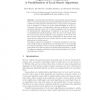Free Online Productivity Tools
i2Speak
i2Symbol
i2OCR
iTex2Img
iWeb2Print
iWeb2Shot
i2Type
iPdf2Split
iPdf2Merge
i2Bopomofo
i2Arabic
i2Style
i2Image
i2PDF
iLatex2Rtf
Sci2ools
117
click to vote
PVM
2004
Springer
2004
Springer
Neighborhood Composition: A Parallelization of Local Search Algorithms
Abstract. To practically solve NP-hard combinatorial optimization problems, local search algorithms and their parallel implementations on PVM or MPI have been frequently discussed. Since a huge number of neighbors may be examined to discover a locally optimal neighbor in each of local search calls, many of parallelization schemes, excluding so-called the multi-start parallel scheme, try to extract parallelism from a local search by distributing the examinations of neighbors to processors. However, in straightforward implementations, when the next local search starts, all the processors will be assigned to the neighbors of the latest solution, and the results of all (but one) examinations in the previous local search are thus discarded in vain, despite that they would contain useful information on further search. This paper explores the possibility of extracting information even from unsuccessful neighbor examinations in a systematic way to boost parallel local search algorithms. Our ke...
Related Content
| Added | 02 Jul 2010 |
| Updated | 02 Jul 2010 |
| Type | Conference |
| Year | 2004 |
| Where | PVM |
| Authors | Yuichi Handa, Hirotaka Ono, Kunihiko Sadakane, Masafumi Yamashita |
Comments (0)

